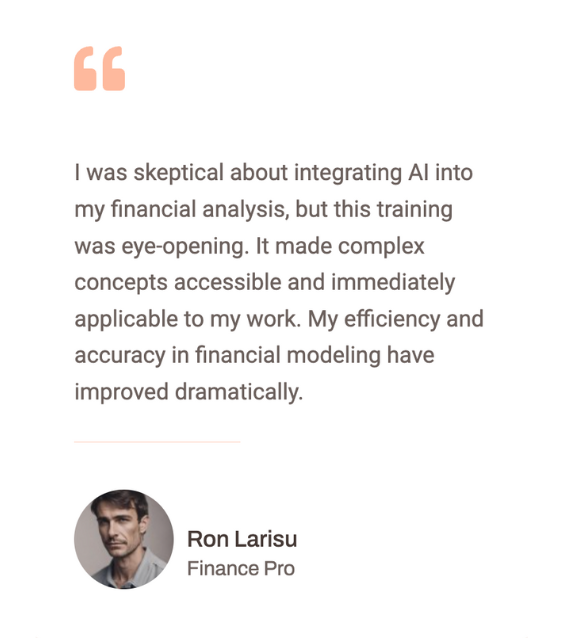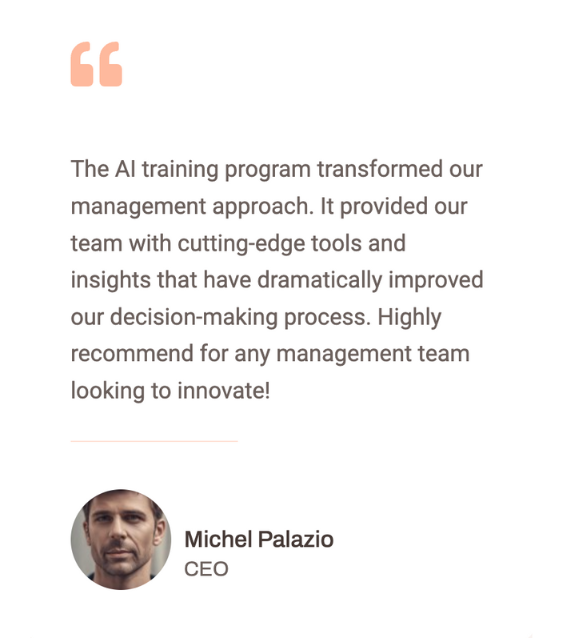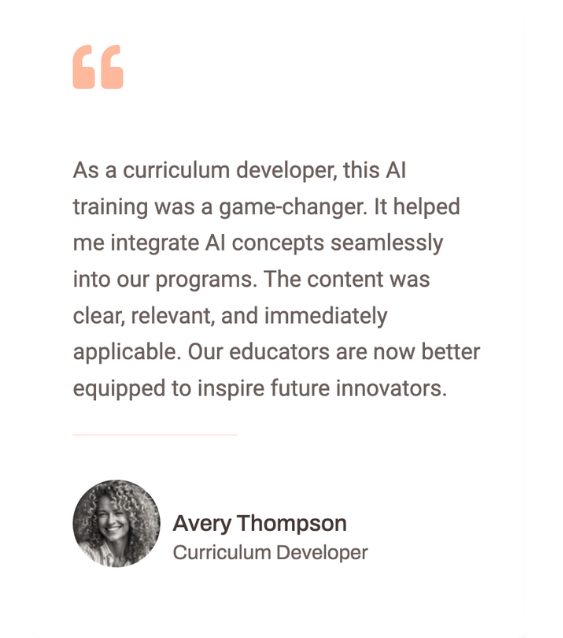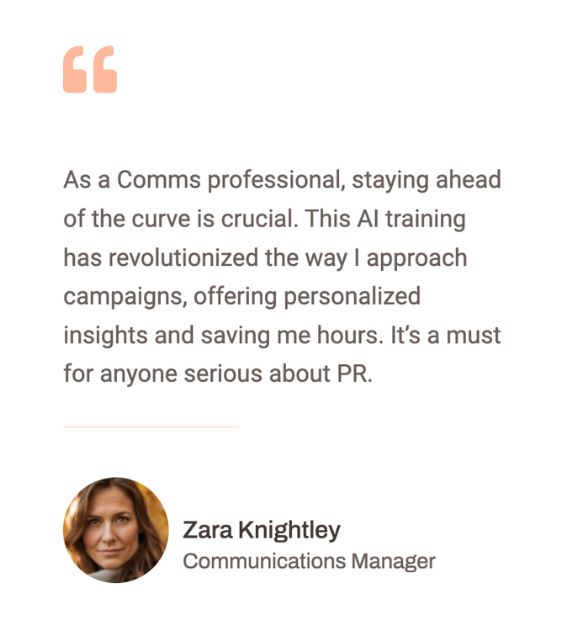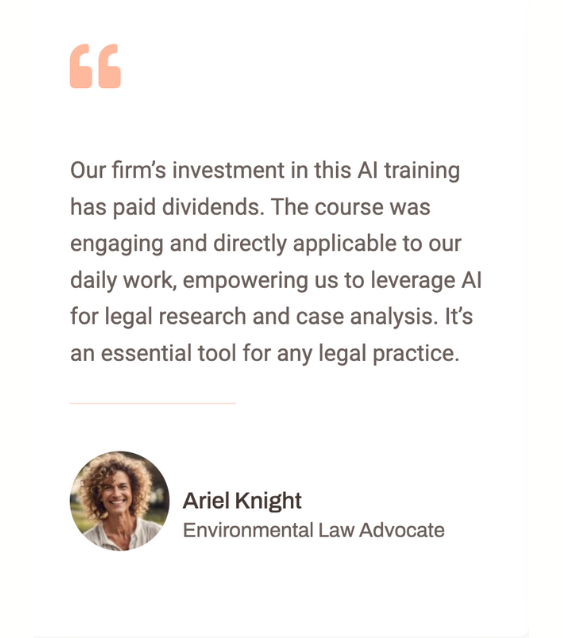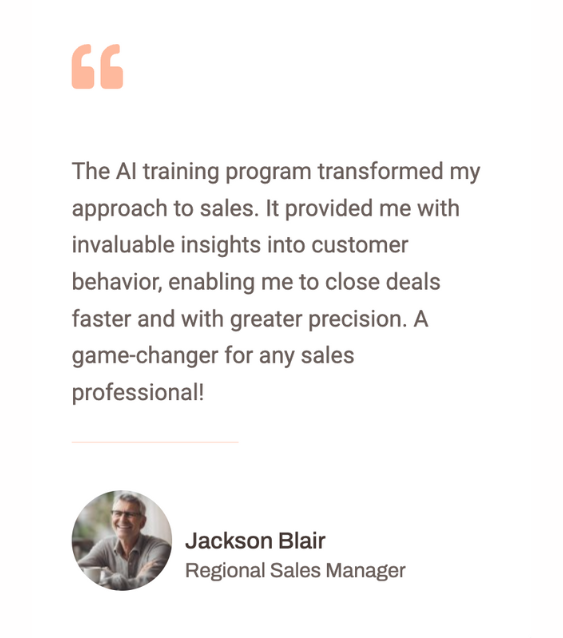Video Course: How AI Impacts the Practice of Law by IBM
Discover how AI revolutionizes legal practice in IBM's course. Uncover the role of AI in enhancing efficiency, from fact gathering to document drafting, while emphasizing the essential need for human judgment and ethical oversight.
Related Certification: Certification: Applying AI in Legal Practice – An IBM Professional Program
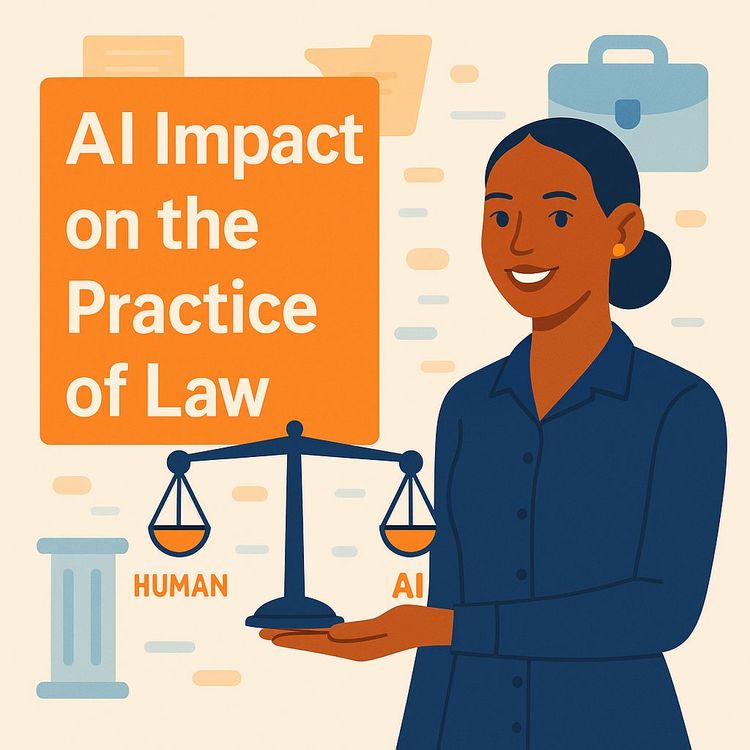
Also includes Access to All:
What You Will Learn
- Understand generative AI and LLMs in legal contexts
- Use AI to gather and summarize ESI efficiently
- Apply AI to legal research and validate sources
- Draft legal documents with AI and perform thorough review
- Identify privacy, ethical, and governance issues
Study Guide
Introduction
The practice of law is evolving, and at the forefront of this transformation is the integration of artificial intelligence (AI). This course, "How AI Impacts the Practice of Law by IBM," is designed to guide you through the profound ways AI is reshaping legal practice. By delving into the intricacies of generative AI and large language models (LLMs), this course offers a comprehensive understanding of how these technologies enhance efficiency in legal tasks while underscoring the indispensable role of human oversight. Whether you're a legal professional or someone interested in the intersection of AI and law, this course will equip you with insights into the responsible and effective use of AI in the legal domain.
Understanding Generative AI and LLMs
Before diving into the specifics of how AI impacts legal practice, it's crucial to grasp the basics of generative AI and LLMs. Generative AI refers to systems that can generate text, images, or other media in response to prompts. Large language models, a subset of generative AI, are trained on vast datasets to understand and produce human-like text. These models excel in natural language processing, enabling them to perform tasks such as summarizing information, drafting text, and even suggesting legal arguments.
Gathering Facts
The Initial Step in Legal Practice
Gathering facts is the foundation of any legal case. Lawyers must collect relevant information to build their case strategy. Traditionally, this involves sifting through a myriad of documents, emails, and other electronically stored information (ESI). With the advent of generative AI, this process has become significantly more efficient.
AI's Role in Fact Gathering
Generative AI and LLMs can rapidly extract and summarize information from extensive datasets, streamlining the process of gathering facts. For instance, consider a case involving a large corporation with thousands of emails and documents. AI can sift through this data, highlighting pertinent information and summarizing key points, saving lawyers countless hours.
Practical Application
Imagine a scenario where a lawyer needs to gather facts about a breach of contract case. With AI, they can quickly identify relevant communications and documents, such as emails discussing contract terms. This allows for a more focused approach to building the case.
Best Practices
While AI enhances efficiency, it's essential to verify the accuracy of AI-generated summaries. Lawyers should cross-check AI outputs with original documents to ensure no critical information is overlooked.
Researching the Law
Enhancing Legal Research
Legal research is a cornerstone of legal practice, involving the identification of relevant statutes, regulations, and case law. Generative AI has "supercharged" this process by offering more precise search results and nuanced analyses.
AI's Capabilities and Limitations
AI tools can suggest potential legal arguments and interpretations. However, they are not infallible. A significant limitation is their tendency to "hallucinate," or generate laws that don't exist. Lawyers must critically assess AI-generated legal information, ensuring its validity and relevance.
Practical Example
Consider a lawyer researching case law for a personal injury case. AI tools can provide a list of relevant precedents and suggest interpretations. Yet, it's crucial for the lawyer to verify these cases and ensure they haven't been overturned.
Best Practices
Always cross-reference AI-generated legal research with authoritative legal databases. This ensures the information is accurate and up-to-date.
Analyzing Facts and Law
AI's Role in Legal Analysis
Analyzing the strengths and weaknesses of a case is a complex task that involves predicting outcomes based on various factors. Generative AI can assist by processing relevant data and offering insights into potential case outcomes.
The Importance of Human Judgment
While AI can provide valuable insights, it cannot replace human judgment. Lawyers must interpret AI-generated analyses and apply their expertise to make informed decisions.
Practical Example
In a criminal case, AI might analyze past cases involving similar charges and predict potential outcomes based on the judge's history. However, the lawyer must consider unique case aspects and apply their judgment to strategize effectively.
Best Practices
Use AI-generated analyses as a supplementary tool, not a definitive answer. Always incorporate human expertise and ethical considerations in case analysis.
Creating Documents
AI in Document Drafting
Document creation is a time-consuming aspect of legal practice. LLMs can assist in drafting initial versions of documents, providing a starting point for lawyers.
The Crucial Role of Lawyers
AI-generated drafts require thorough review and refinement by lawyers to ensure they meet client needs and adhere to legal standards. A lawyer's expertise, judgment, and ethical responsibilities cannot be delegated to AI.
Practical Example
For a contract negotiation, AI might generate a draft contract based on standard templates. The lawyer must then tailor this draft to the client's specific requirements and ensure all legal obligations are met.
Best Practices
Use AI for initial drafts, but always conduct a comprehensive review. Ensure the final document aligns with the client's objectives and legal requirements.
Privacy Implications and Ethical Considerations
Protecting Client Confidentiality
Lawyers have an ethical obligation to protect client confidentiality. When using AI tools, it's crucial to be aware of privacy implications and AI governance systems.
Practical Application
Ensure any AI tool used complies with privacy regulations and does not compromise client data. For instance, when using AI for document analysis, verify that the tool does not inadvertently share sensitive information.
Best Practices
Regularly review AI governance policies and ensure compliance with legal and ethical standards. Educate your team about the importance of maintaining client confidentiality when using AI tools.
Human Oversight and Limitations of AI
The Need for Human Involvement
AI tools, while efficient, have limitations. They cannot replace human expertise or ethical judgment. Lawyers must be involved at every stage of AI usage, reviewing and validating all AI-generated outputs.
Practical Example
In a case analysis, AI might suggest a particular legal strategy. However, the lawyer needs to assess its feasibility and ethical implications, ensuring it aligns with the client's best interests.
Best Practices
Maintain rigorous oversight of AI-generated outputs. Regularly update your knowledge of AI limitations and ensure all legal advice is grounded in verified information.
Potential Applications Beyond Law
The insights gained from leveraging AI in legal practice can extend to other industries facing information overload. Professionals in fields such as healthcare, finance, and education can benefit from AI's ability to manage and analyze vast amounts of data.
Practical Example
In healthcare, AI can assist in analyzing patient data to suggest potential diagnoses. Similarly, in finance, AI can process market data to offer investment insights.
Best Practices
Explore cross-industry applications of AI, and consider how AI tools can be adapted to address information challenges in various sectors.
Conclusion
AI offers transformative potential for the legal profession, enhancing efficiency in tasks such as fact gathering, legal research, analysis, and document drafting. However, it's essential to remember that AI is a tool, not a replacement for human lawyers. Legal professionals must maintain rigorous oversight, verify AI-generated outputs, and uphold their ethical responsibilities, particularly concerning client confidentiality and the accuracy of legal advice. By thoughtfully integrating AI into their practice, lawyers can harness its benefits while ensuring the highest standards of legal service.
Podcast
There'll soon be a podcast available for this course.
Frequently Asked Questions
Introduction to the FAQ Section
Welcome to the Frequently Asked Questions section for the 'Video Course: How AI Impacts the Practice of Law by IBM'. This comprehensive FAQ aims to address common queries from both beginners and seasoned professionals about the integration of AI in legal practice. From understanding the basics of generative AI to exploring its advanced applications in law, this resource is designed to provide clarity and insight into how AI is reshaping the legal landscape.
What are the main ways lawyers are currently leveraging generative AI and large language models in their practice?
Lawyers are employing these emerging technologies across several key areas of their work. This includes more efficiently gathering facts from electronically stored information (ESI), supercharging legal research by providing more precise results and nuanced analysis of statutes, regulations, and case law, assisting in the analysis of facts and law to determine case strengths and weaknesses, and aiding in the initial drafting of legal documents.
How does AI assist lawyers in the crucial initial step of gathering facts for a case?
Gathering facts, especially from the increasing volume of electronically stored documents (ESI) such as those found on computers and in text messages, can be very challenging. Generative AI and large language models help lawyers extract information more efficiently and summarise key details from this vast amount of data. This streamlines the initial stages of problem-solving for clients.
In what ways has generative AI "supercharged" legal research compared to traditional methods?
Generative AI tools, with their natural language processing capabilities, can provide lawyers with more precise search results when looking for relevant statutes, regulations, and case law. They can also offer more nuanced analyses of these legal authorities and even suggest potential arguments and interpretations of the law, making the research process more efficient and potentially uncovering connections that might be missed with traditional methods.
While AI offers benefits in legal research, what crucial limitations and responsibilities must lawyers be aware of?
Despite the advancements, generative AI tools have the tendency to "hallucinate" or create laws that do not exist. Therefore, lawyers have a professional responsibility to meticulously review any legal information generated by AI, ensuring its accuracy and that it constitutes "good law" (i.e., hasn't been overturned). They must also verify that the law supports their advice and arguments.
How can generative AI assist lawyers in analysing the facts of a case and relevant legal precedents?
Generative AI tools can help lawyers analyse the gathered facts and legal research to better understand the strengths and weaknesses of a particular case. This analysis often involves prediction, and AI can assist in considering factors like the type of case, jurisdiction, and even the presiding judge to provide insights into potential outcomes and inform case strategy.
What is the role of AI in document creation for lawyers, and what important caveats must be considered?
Large language models can be incredibly useful for the initial drafting of legal documents, providing a starting point and potentially saving time. However, it is crucial to remember that AI's role is limited to the "initial draft". Lawyers must thoroughly review, refine, and ensure that any document generated with AI meets the specific needs of their client. A lawyer's expertise, judgment, and ethical responsibilities cannot be delegated to AI.
What are the key ethical and practical considerations regarding privacy when lawyers use generative AI tools?
Lawyers have a strict ethical obligation to protect the confidentiality of their clients' information. When using generative AI, they must be particularly vigilant about the privacy implications and be aware of the AI governance systems associated with the models they employ. Ensuring client confidentiality remains paramount, and lawyers must carefully consider how client data is handled by these tools.
What is the overarching message regarding the integration of AI in the legal profession, according to the source?
The central message is that while generative AI and large language models offer significant assistance and can augment the work of lawyers across various tasks, they can never replace the crucial role of human lawyers. Human judgment, ethical considerations, and the ultimate responsibility for legal advice and representation remain firmly with the legal professional. A lawyer's involvement is essential at every stage of using these tools, and all AI-generated output must be carefully reviewed by a lawyer.
What challenges do lawyers face when gathering facts, and how does AI mitigate these challenges?
Lawyers often deal with vast amounts of Electronically Stored Information (ESI), which can be overwhelming to process manually. AI helps by efficiently extracting and summarising relevant information from these large datasets, significantly reducing the time and effort required in the discovery phase. AI streamlines data processing and helps lawyers focus on more strategic aspects of case preparation.
What are the primary sources of law, and how has AI improved research in these areas?
The primary sources of law include statutes, regulations, and case law. AI enhances research by providing more precise search results and offering nuanced insights into these legal texts. With natural language processing, AI can interpret complex legal language, making it easier for lawyers to find relevant information and develop stronger legal arguments.
What does it mean when AI "hallucinates" in legal research, and how should lawyers handle it?
AI "hallucination" refers to instances where AI generates incorrect or non-existent legal information. Lawyers must remain vigilant, cross-checking AI-generated data with authoritative sources to ensure accuracy. Professional diligence is essential to avoid relying on faulty AI outputs that could undermine legal arguments or advice.
How does AI contribute to predicting case outcomes?
AI analyses patterns in past case data, considering factors such as jurisdiction, case type, and even judge behavior, to predict possible outcomes. This predictive capability aids lawyers in strategizing and making informed decisions about case direction. However, predictions should be used as supplementary insights rather than definitive conclusions.
What role does AI play in drafting legal documents, and why is human oversight crucial?
AI assists in creating initial drafts of legal documents, saving time and effort. However, human oversight is crucial to ensure these drafts meet legal standards and client needs. Lawyers must refine AI-generated drafts, incorporating their expertise and understanding of client-specific contexts. Human judgment remains irreplaceable in legal document preparation.
What privacy considerations must lawyers keep in mind when using AI tools?
Lawyers must ensure client data confidentiality when using AI tools. This involves understanding the data handling practices of AI vendors and implementing robust security measures. Client trust hinges on confidentiality, and any breach could have serious ethical and legal implications. Lawyers should be proactive in safeguarding sensitive information.
Can AI replace lawyers, and why or why not?
AI cannot replace lawyers because it lacks human judgment, ethical reasoning, and the ability to understand nuanced client needs. While AI can handle repetitive tasks and provide valuable insights, the human element is indispensable in interpreting the law, advising clients, and making strategic decisions. AI serves as a tool to enhance, not replace, legal expertise.
What are statutes, and how do they relate to regulations?
Statutes are laws enacted by legislative bodies, such as Congress or state legislatures. Regulations are detailed rules created by administrative agencies to implement and enforce these statutes. Lawyers must understand both to effectively navigate the legal landscape and provide accurate legal counsel.
What is case law, and why is it important?
Case law, or judge-made law, consists of legal principles established through judicial decisions. It serves as a guiding framework for future cases with similar circumstances. Understanding case law is crucial for lawyers as it informs legal strategies and helps predict how courts might rule on specific issues.
What are the potential benefits and risks of using AI in legal research?
AI offers efficiency and precision in legal research, enabling lawyers to access relevant information quickly. However, risks include reliance on inaccurate AI outputs and the ethical implications of data usage. Lawyers must balance AI's advantages with careful oversight to mitigate risks and maintain high standards of legal practice.
How might AI change the way lawyers approach discovery and case preparation?
AI streamlines the discovery process by efficiently processing large volumes of data, identifying relevant facts, and highlighting key information. This allows lawyers to focus on strategic aspects of case preparation, such as developing legal arguments and advising clients. AI enhances productivity and enables more thorough case analysis.
What ethical considerations must lawyers address when integrating AI tools?
Lawyers must ensure AI tools comply with ethical standards, particularly regarding client confidentiality and data security. They should also be aware of potential biases in AI systems and maintain responsibility for the legal advice provided. Ethical vigilance is essential to uphold professional integrity and client trust.
How might the roles and responsibilities of lawyers evolve with AI advancements?
As AI handles routine tasks, lawyers will focus more on strategic, advisory, and client-facing roles. Skills in data analysis, technology management, and ethical decision-making will become increasingly important. Lawyers will need to adapt to new tools while maintaining their core responsibilities of providing sound legal advice and representation.
What are common misconceptions about AI in the legal field?
A common misconception is that AI can fully replace human lawyers. In reality, AI is a tool that enhances legal work but cannot replicate the nuanced understanding and ethical reasoning of human professionals. Another misconception is that AI is infallible; lawyers must remain vigilant to ensure AI outputs are accurate and reliable.
What are some practical applications of AI in legal practice?
AI can be used for contract analysis, e-discovery, legal research, and predictive analytics. It helps automate repetitive tasks, allowing lawyers to focus on more complex aspects of legal work. By integrating AI, firms can improve efficiency, reduce costs, and enhance client service, ultimately providing a competitive edge in the legal market.
What challenges might lawyers face when implementing AI in their practice?
Challenges include ensuring data privacy, managing ethical considerations, and integrating AI with existing systems. Lawyers must also stay updated on AI developments and understand the limitations of these tools. Training and adapting to new technologies require investment and commitment but are essential for successful AI implementation.
Certification
About the Certification
Upgrade your CV with expertise in applying AI to legal practice. This IBM Professional Program equips you with practical skills to navigate legal workflows, streamline research, and enhance decision-making using the latest AI tools.
Official Certification
Upon successful completion of the "Certification: Applying AI in Legal Practice – An IBM Professional Program", you will receive a verifiable digital certificate. This certificate demonstrates your expertise in the subject matter covered in this course.
Benefits of Certification
- Enhance your professional credibility and stand out in the job market.
- Validate your skills and knowledge in cutting-edge AI technologies.
- Unlock new career opportunities in the rapidly growing AI field.
- Share your achievement on your resume, LinkedIn, and other professional platforms.
How to complete your certification successfully?
To earn your certification, you’ll need to complete all video lessons, study the guide carefully, and review the FAQ. After that, you’ll be prepared to pass the certification requirements.
Join 20,000+ Professionals, Using AI to transform their Careers
Join professionals who didn’t just adapt, they thrived. You can too, with AI training designed for your job.











